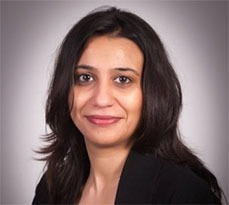Dr Ritika Dave talks about asking the right questions and having an analytical and open mind in the healthcare industry. Transitioning from a career in medicine and research to consulting and now managing a global pharma portfolio, Dr Dave has changed gears with each career change.

“Before my MBA I had been in science, in research and medicine for several years. I trained initially as a physician, then I got the opportunity to go into research and to work for the FDA (Food and Drug Administration, USA), which opened a lot of doors in a different direction.”
Dr Ritika Dave (MBA 2012) followed this with an opportunity to bring both her medical and her research background together. She took a firm step into the consulting world, working with L.E.K. Consulting.
“That is when I got really interested in the ‘business’ aspect of science.”

Working within the consultancy sector Dr Dave explained that; “Companies are positioning themselves to get the best treatment for their patients, and you need doctors and scientists working within the ‘business’ of science to understand the end goal – which is patient treatment.”
“Having doctors and scientists working within the business, gives companies that edge over competitors as they are qualified to fully understand the business.”
“That is where those with an MBA come in,” she explains.
“I did a couple of consulting projects before coming into the MBA and that was really the trigger to pursue an MBA at Cambridge.”
The consulting landscape
Dr Ritika Dave explains what the landscape of healthcare consulting is like.
“Consulting gives you this huge platform where you are able to explore the different parts of the scientific business. It is very different to working in a hospital as a doctor, where your focus is on patient care or even in a pharma company where you are producing the products for patient care.”
“Consulting allows you to get to know the business from every single angle,” she explains. “The good thing about consulting, was that it really helped me get exposure to so many different kinds of projects and so many different disease areas, as well as so many companies working across the sector.”
“It is a very fast paced environment, but it also offers a very steep learning curve.” For anyone trying to get into the business of consulting or the business of pharma consulting, “It is a very good platform as it gives you that kickstart.”
“It takes a while for you to get to the level that your opinion matters.” She continues; “It’s a combination of your previous experience, building on it and learning fast, that gets you to the level where you can go into a room of senior executives and say that this is your opinion, and they listen to it.”
A transition from consultant to manager
Moving from the role of consultant to Engagement Manager at L.E.K Consulting has brought different aspects to the role and consequently, the skill set required. “As a consultant you are running the show, you are running the project completely from its base. I was responsible for managing the four or five associates in the team. Essentially you are executing the strategy that the partners and the managers have devised with the client, and you are ultimately responsible for getting the project to the end result.”
Moving from a consultant to a manager, there are so many changes and different things become important.
“There are massive changes as you transition from one to another. As a consultant you are very into the details, and suddenly as a manager you are only looking at the bigger picture and the wider perspective.”
“As a professional equipped with an MBA, you are so much better informed as you have to have that vision for your client. The growth in your skill set and your experience is huge. Especially with the interaction that you have with the senior executives which also gives you a deeper breadth of experience.”
Working now at AstraZeneca in the UK, Ritika works with the team on Global Portfolio Management. “We are doing the analysis at a portfolio level, that then feeds into the decision making at a senior level. We do the analytics as a whole and then we sit with them to make decisions about the next portfolio investment, from new research and products on the market and across different disease areas.”
Risk management
Both risk management and data analytics are a huge part of the day to day business of science for Dr Dave.
“This is part of the game for any pharma company. The drug development process itself is very long and you don’t know where you will land from where you have started – uncertainty has to be considered throughout the process.”
“Decisions are very high risk, you need to constantly stop and check where you are in the project and be very careful about the kind of products that you have invested in or the type of disease you have decide to focus company resources on.” She continues; “This is why the analytics are so important throughout the lifecycle of the project. You are constantly checking the process is aligned to the vision and strategy of the company from start to finish.”
A pharma company manages the huge uncertainty in this sector, by mitigating the risks across a wide range of products and projects; so managing investment in new products and drugs carefully alongside the life cycle management (LCM) projects that are the basis of the existing project portfolio.
“Uncertainty doesn’t go away; it just needs better analytics – so we can take the best decisions around the uncertainty.”
A career in healthcare consulting
Ritika has plenty of experience in recruitment and talent acquisition for both life sciences and pharma.
For those pursuing an MBA and considering a career in healthcare or specifically in healthcare consulting, Dr Dave advises on several essential qualities.
“I would say it is not a must to have a background in healthcare, but I would say it is a must to have an interest in healthcare more widely. Having such an interest means that you are aware of the challenges that come with the healthcare industry, and that you know and understand that the industry dynamics are complex and can be somewhat different from some other industry dynamics.”
“There is a certain expectation as an MBA that you already have that analytical mind, and combine that with the industry knowledge that you can bring, and so you offer that edge that the company is looking for.”
In terms of the interview and the recruitment process, “Show a keen interest in the industry and demonstrate some examples of how you have perhaps contributed to the industry.”
“I would say to new MBA graduates coming into the sector, that it needs to be well researched and it needs to be something that you can demonstrate that builds on your previous experience. In the short term at least, know where you want to go.”
Bringing business experience to the healthcare sector means that you bring a very analytical mind to the problem. “You need to know where the problem lies in the first place and then you need to ask the right questions.”
Getting to the next level of the problem involves knowing what questions to ask. “Be as open minded and as analytical as you can be.”
Build on your experience and learn from others experiences as well. Keeping up to date on the sector and trends across the industry takes time and experience. “Listen to what is going on around you, keep up to date with the research, read about what other companies are doing in the sector, and keep your eyes open about what research is happening.”
“For example, if I had an oncology portfolio, and I knew a certain risk with a certain type of oncology drug, I would question how we might mitigate that risk in advance, if we had that drug in our company portfolio.”
“Healthcare is a great business, it is evolving, and it is something that can give everyone an opportunity to progress.”
Finding the ‘sweet spot’
“The biggest question for me, when I was doing my MBA at Cambridge, was ‘Where in healthcare do I want to be?’. Healthcare is massive and it is wide, there are so many different aspects to the sector, from pharma at one end to hospital consulting, even digital healthcare consulting, and care centres or dental practices; all of which are looking for a similar type of business perspective.”
“My biggest challenge coming in was my perspective – which was very small at the time, because I was a doctor and researcher. I needed to know a little more about healthcare to know where my skillset would sit the best. I think I’ve now found my ‘sweet spot’.”

